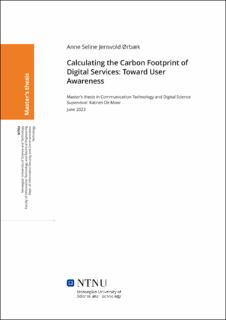| dc.contributor.advisor | Moor, Katrien De | |
| dc.contributor.author | Ørbæk, Anne Seline Jensvold | |
| dc.date.accessioned | 2023-10-21T17:19:49Z | |
| dc.date.available | 2023-10-21T17:19:49Z | |
| dc.date.issued | 2023 | |
| dc.identifier | no.ntnu:inspera:146715749:35266820 | |
| dc.identifier.uri | https://hdl.handle.net/11250/3097912 | |
| dc.description.abstract | I dagens samfunn er buzzwords som Internet of Things (IoT), skytje- nester, Artificial Intelligence (AI) og Viritual Reality (VR) stadig mer utbredt, noe som gjenspeiler den pågående teknologiske revolusjonen på verdensbasis. Selv om digitaliseringen har fått betydelig anerkjennelse for sine positive bidrag til sosial interaksjon, effektivitet i flere sektorer og innsatsen for å bekjempe klimakrisen, er det nødvendig å adressere de ulemper den medfører. Nylige rapporter har rettet oppmerksomheten mot økende utslipp av drivhusgasser som følge av energiforbruket til digitale tjenester. Denne avhandlingen tar sikte på å undersøke metodene som brukes for å beregne disse utslippene og utforske nivået av bevissthet blant digitale brukere angående denne miljøpåvirkningen. For å oppnå dette presenterer avhandlingen en omfattende litteraturstudie som gjen- nomgår tidligere forskning og vurderer eksisterende kalkulatorer for å utforske beregningene av den digitale påvirkningen. I tillegg benyttes empiriske forskningsmetoder, inkludert en kvantitativ undersøkelse rettet mot digitale brukere over 18 år og kvalitative fokusgruppesesjoner med barn i alderen 10 til 13 år.
Resultatene fra litteraturstudien fremhever de betydelige utfordringene forbundet med nøyaktig kvantifisering av utslippene fra digitale tjenester. Mangelen på standardiserte metoder for slike beregninger undergraver sammenlignbarheten mellom ulike kilder, gitt mangelen på konsistens i rapporterte tall. Denne mangelen på standardisering gjenspeiles også i variasjonene som observeres blant kalkulatorer, som bruker ulike data- kilder og dermed gir forskjellige estimater. Konsekvensen av dette er at troverdigheten til disse estimatene kompromitteres, noe som begrenser på- liteligheten deres og hindrer omfattende vurderinger av miljøpåvirkningen fra digitale tjenester.
De empiriske brukerstudiene avslører at selv om digitale brukere ge- nerelt sett mangler kunnskap om miljøpåvirkningen fra digital teknologi, viser de interesse for å endre digitale vaner for å redusere sin miljøavtrykk. Imidlertid identifiserer studien også ulike barrierer som hindrer atferds- endringer, inkludert mangel på kunnskap, en følelse av maktesløshet når det gjelder å utgjøre en forskjell og det faktum at digitalisering har blitt en måte å sosialisere seg på. Bemerkelsesverdig viser de kvalitative fokusgruppesesjonene med barn at de er mer villige til å endre vaner sammenlignet med voksne, siden deres digitale vaner er mindre rotfestet i livene deres.
Denne masteroppgaven gir verdifulle innsikter i metodene som bru- kes til å kvantifisere miljøpåvirkningen av digitale tjenester og belyser bevissthetsnivået blant et utvalg på 242 digitale brukere. Resultatene un- derstreker behovet for standardiserte tilnærminger i utslippsberegninger og legger vekt på betydningen av å adressere barrierer for atferdsend- ring. På lang sikt bidrar denne forskningen til en bedre forståelse av miljøkonsekvensene av digitalisering. | |
| dc.description.abstract | In today’s society, buzzwords such as the Internet of Things (IoT), cloud computing, Artificial Intelligence (AI), and Virtual Reality (VR) are increasingly prevalent, reflecting the ongoing technological revolution worldwide. While digitalization has gained significant recognition for its positive contributions to social interaction, increased efficiency in multiple sectors, and efforts to combat the climate crisis, it is imperative to address the drawbacks it entails. Recent reports have brought attention to the escalating greenhouse gas emissions resulting from the energy consumption of digital services. This thesis seeks to investigate the methodologies employed in calculating these emissions and explore the level of awareness among digital users regarding this environmental impact. To achieve this, the thesis presents a comprehensive literature study reviewing previous research and assessing existing calculators to explore the quantification models of the digital impact. Additionally, empirical research methods are employed, including a quantitative survey targeting digital users aged 18 and above and qualitative focus group sessions involving children aged 10 to 13.
The findings from the literature study highlight the significant chal- lenges associated with accurately quantifying the emissions from digital services. The absence of a standardized methodology for such calculations undermines the comparability of different sources, given the lack of consis- tency in reported figures. This lack of standardization is further reflected in the variations observed among calculators, which utilize disparate data sources and consequently yield divergent estimations. Consequently, the credibility of these estimations is compromised, limiting their reliability and hindering comprehensive assessments of the environmental impact of digital services.
The empirical user studies reveal that while digital users generally lack knowledge about the environmental impact of digital technology, they demonstrate an interest in changing their digital habits to reduce their environmental footprint. However, the study also identifies various barriers that hinder behavioral changes, including a lack of knowledge, a sense of powerlessness in making a difference, and that digitalization has transformed into a means of social interaction. Notably, the qualitative focus group sessions with children reveal that they exhibit a greater willingness to change their habits compared to adults, as their digital habits are less deeply ingrained in their lives.
This master thesis provides valuable insights into the methodologies used to quantify the environmental impact of digital services and sheds light on the level of awareness among a sample of 242 digital users. The findings underscore the need for standardized approaches in emissions calculations and emphasize the importance of addressing barriers to behavioral change. Ultimately, this research contributes to a better understanding of the environmental implications of digitalization. | |
| dc.language | eng | |
| dc.publisher | NTNU | |
| dc.title | Calculating the Carbon Footprint of Digital Services: Toward User Awareness | |
| dc.type | Master thesis | |
